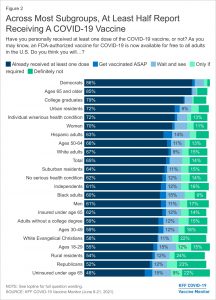On July 9th, SC Governor McMaster pushed back against President Biden's targeted "door-to-door" COVID-19 vaccine strategy. In a letter to the Chairman of the S.C. Department of Health and Environmental Control, the governor asked agency leaders to promptly issue a directive to state and local healthcare organizations which would prohibit "the use of the Biden Administration's 'targeted' 'door to door' tactics in the State's ongoing vaccination efforts." As previously reported by UncoverDC, Biden said of his plans:
"We are continuing to wind down the mass vaccination sites that did so much in the spring. … Now, we need to go to community by community, neighborhood by neighborhood, and oftentimes door to door, literally knocking on doors, to get help for the remaining people protected from the virus."
McMaster's letter warned that government-led vaccine crews "showing up unannounced or unrequested at the door of 'targeted' homeowners or on their property will further deteriorate the public's trust and could lead to potentially disastrous public safety consequences." The governor wrote:
"A South Carolinian's decision to get vaccinated is a personal one for them to make and not the government's. Enticing, coercing, intimidating, mandating, or pressuring anyone to take the vaccine is a bad policy which will deteriorate the public's trust and confidence in the State's vaccination efforts."
Immediately following Governor McMaster's letter, DHEC Director Edward Simmer, MD, stated that his agency, after receiving a copy of the letter, communicated with the Governor's Office. Emphasizing that DHEC offers in-home vaccines through its homebound vaccination program, Simmer went on to say DHEC's vaccine outreach efforts "have not and will not include door-to-door visits," but indicated his agency would continue to "focus on making lifesaving COVID-19 vaccines as accessible as possible across the State." He stressed that DHEC strongly encourages all eligible South Carolinians to get fully vaccinated to protect themselves and their community.
Insisting that "the vaccine is our best hope for ending the pandemic once and for all," Simmer's press release stated DHEC continues to advise that the overwhelming majority of people who are hospitalized and dying from COVID-19 are those who are not fully vaccinated, adding that "low statewide vaccination rates allow the virus to continue to mutate and more significant variants to spread, as is currently occurring in many states and countries."
In a recent statement, while on paper still complying with McMaster's letter directing DHEC to prohibit Biden's invasive door-to-door vaccine strategy (by advising "no activities should include unsolicited door-to-door residential outreach") a Jul. 16th DHEC news release announced the agency is seeking "applicants to perform hyperlocal COVID-19 vaccine outreach efforts." The release states that the agency—which is launching a "$5 million grant assistance program to fund enhanced community vaccine awareness and understanding"—is accepting grant applications through Aug. 5th from interested organizations.
The funding for the initiative will come from the U.S. Department of Health and Human Services (HHS) ELC ENHANCING DETECTION THROUGH CORONAVIRUS RESPONSE AND RELIEF (CRR) supplemental funds (paid for by American tax dollars), which will "provide additional critical support to jurisdictions as they continue to address COVID-19 within their communities, $19.11 billion from the Coronavirus Response and Relief Supplemental Appropriations Act of 2021, P.L. 116-260, will be provided to ELC recipients." Reiterating its objective, DHEC repeats:
Our goal is to vaccinate as many eligible South Carolinians as possible and help end the COVID-19 pandemic.
 The Biden administration's widespread vaccine outreach program is reinforced by HHS Secretary Xavier Becerra, who recently commented the government "absolutely" has a right to know the vaccination status of U.S. citizens. When asked whether Biden would push to require proof of vaccination, he replied, "We want to give people the sense that they have the freedom to choose, but we hope that they choose to live." Elaborating on why someone's vaccination status is the government's business, Becerra stated:
The Biden administration's widespread vaccine outreach program is reinforced by HHS Secretary Xavier Becerra, who recently commented the government "absolutely" has a right to know the vaccination status of U.S. citizens. When asked whether Biden would push to require proof of vaccination, he replied, "We want to give people the sense that they have the freedom to choose, but we hope that they choose to live." Elaborating on why someone's vaccination status is the government's business, Becerra stated:
"The federal government has spent trillions of dollars to try and keep Americans alive during this pandemic. So it is absolutely the government's business, it is taxpayers' business if we have to continue to spend money to try and keep people from contracting COVID and helping reopen the economy."
The DHEC grant application notes the additional resources provided by the government's taxpayer-funded COVID-19 assistance, which is "part of the CARES Act and Paycheck Protection Program and Health Care Enhancement Act supplements," are intended to "prevent, prepare for, and respond to coronavirus." The stated purpose of the COVID-19 Vaccine Outreach Initiative is "to increase awareness and knowledge of COVID-19 and COVID-19 vaccines, and/or reduce vaccine hesitancy or barriers, in a manner that results in increased vaccinations among members of key populations," such as:
- Those living in rural areas (areas that lack access to broadband, healthcare, and other services).
- Minority residents (African American, Latinx, Native American, Asian American, Pacific Islander, etc.).
- Other vulnerable communities.
Activities conducted by the subrecipient may include, but are not limited to, the following:
- Distributing DHEC informational materials.
- Conducting safe in-person or virtual educational sessions with community members.
- Placing social media and other media advertising messages on channels designed to reach focused populations.
- Utilizing non-traditional outreach methods (informational signs at intersections, point-of-sale advertising, direct mailers, grassroots outreach, etc.).
- Providing transportation to people who want to get vaccinated.
With the all-encompassing stated purpose of the COVID-19 Outreach Initiative, many consider it is safe to assume that "unsolicited—given or supplied without being requested or asked for—door-to-door residential outreach" can be circumvented by first engaging in the activities listed above.


